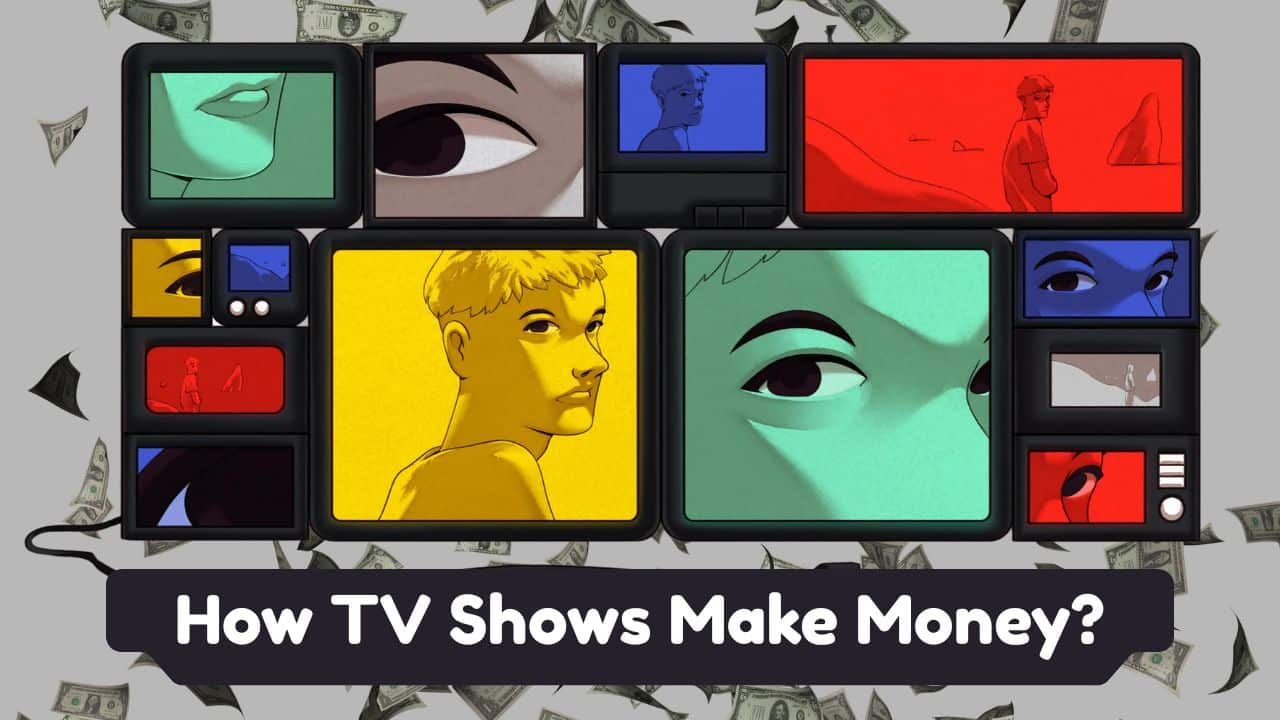Television is a huge source of entertainment, and it engages millions of people throughout the world. Other than enlisting narration and entertainment, there is one important question that comes to your mind: How do TV shows earn money?
Learning the process of monetization of the TV show helps to understand the complexity of revenue models that keep the industry afloat. TV shows use various methods to earn money, like advertising and syndication, digital streaming, and international broadcast rights. This blog deeply explains the TV revenue model and identifies the most crucial sources that lead to the financial success of a show.
Core of the Television Business
Monetization of TV shows refers to the process by which television producers, television networks, and other interested parties transform content into revenue. It has been developed due to technology, the preferences of viewers, and distribution channels. The revenue of the traditional TV shows comes from TV advertising. This advertising will be valued based on such parameters as ratings, audience profile, and the time of day the advertisement should be aired.
Multiple Ways in Which TV Shows Earn
Here are some ways that help TV shows earn money:
1. Advertisements
Advertising through television is still the keystone in monetizing TV shows. Advertisers purchase commercial airtime on broadcast shows, depending on the number of viewers and demographics. Premium ad rates are offered to higher-rated shows, as the brands want to be exposed to the masses. This conventional advertising revenue is used to finance the cost of production and the operations of the broadcasters.
2. Subscription Fees
Subscription-based revenue models can be mainly seen on sites such as Netflix and Hulu, where buyers are charged a fixed fee to have unlimited access to content. These services have no ads, which appeals to subscribers who want uninterrupted entertainment. This model focuses on unique, quality content that can hold on to the subscribers on the platforms. It serves as a significant source of revenue for streaming services that are creating original TV shows. Netflix is one of the platforms that makes money from original shows. Another platform, Hotstar, offers you a premium subscription that costs around Rs 1,499 per year and attracts millions, thereby generating significant revenue.
3. International Broadcasting Rights

It can be sold and brings in a lot of revenue through the licensing of TV shows to other networks and streaming sites across the world. These rights will enable shows to be broadcast around the world to expand their audiences and income. International licensing enhances the global presence of a show, and by many folds, the production costs are recovered over and over again, giving it a stable, long-term revenue stream other than just depending on domestic viewership. You can see IPL sell its exclusive broadcasting rights to major networks and OTT platforms for billions of dollars, generating huge revenue.
4. Pay-Per-View Income
PPV is flexible and brings in high potential revenues on high-end content and is often used in the case of sporting events, concerts, or high-end premieres. This is an ideal model to use when time-limited and high-interest programming is needed, and supplements the other sources of revenue by directly monetizing individual viewer experiences. Many times, you pay for any event that offers you only one one-time view, and to watch it again, you have to pay again for it.
5. Digital Advertising Revenue for Shows
Due to the emergence of digital streaming services, the importance of digital ad revenues on shows has been established. Free or tiered service models rely on different advertisements to raise revenues without restriction. This approach gives detailed audience data and increased ad interaction, and digital ad revenue is an essential part of a TV show. For example, OTT advertising campaigns are held on a high budget targeting millions of audience, generating more and more visits on their website, which enables them to earn.
6. Syndications
Once TV shows have been first aired, they go into syndication, where other channels can buy rerun rights. This procedure makes the earning potential of a show last for years. A perfect example is Star Trek: The Next Generation (an American television series), which generated significant revenue through syndication deals by selling rerun rights to various local stations, maximizing profits beyond original airing.
7. Licensing and Merchandising
A lot of successful television programs get paid to license their brands to sell merchandise in the form of clothes, toys, and collectibles. That makes branded products attractive to you, which leads to fan loyalty and extra income other than from broadcasting. This plan transforms the popularity of shows into measurable sales that expand the financial ecology surrounding a franchise. As you can see, Sony YAY! secured licensing of the popular anime Naruto in India and partnered with The Souled Store for exclusive apparel and accessories.
8. Content Licensing to OTT Platforms

It involves producers who negotiate for legal agreements to have platform rights to stream their content for a particular time period. OTT platforms pay royalty fees for securing exclusive or non-exclusive streaming access. This allows the creators to have a wide reach of their content, grabbing a larger audience. Whenever you want to watch any new content, I think the first thought that comes to your mind is Disney Hotstar. Have you ever thought why it is? It’s because the platform has invested ₹120 crores in original shows like Hotstar Specials and licensed popular TV content, becoming one of the top OTT platforms with millions of subscriptions and revenues through content licensing and distribution.
9. Sponsorships and Product Placement
TV programs are also known to make product placement deals, where brands pay money to incorporate their products naturally in scenes. They can also use sponsored content partnerships or themed episodes, or co-brand promotions. These collaborations provide other methods of monetization that combine marketing and narration so that both shows and advertisers benefit. Many reality TV shows you see, like Sa Re Ga Ma Pa, have many sponsorships, mainly for brand visibility and audience engagement. Many new viewers get attracted to these shows through these sponsorship brands.
10. Social Media and Digital Platform Integration
The introduction of social media and digital platforms has transformed the way TV shows are viewed by the audience. More than television, you are more active on social media. Shows are creating their social media channels to keep their followers updated on behind-the-scenes videos, personal photos/ videos, which brings in fan engagement and feedback. Digital platforms allow personalized viewing and content sharing, improving loyalty and reach.
The Family Man series used their innovative social media campaign to grab more audience and make them aware about the upcoming season-related news. It is an effective way, as you can see, whenever you are scrolling through your Instagram and you see a post or ads related to any new show, your instant action is checking the updates of the show. This is how your action makes social media one of the ways of earning.
11. Live Events

Live events generate revenue by inviting a large audience through the sale of show tickets and also sponsorship deals. To have a high viewership, live events need to be organized well, keeping in mind the safety, comfort, and entertainment of the crowd. They remain a powerful tool for maximizing TV show monetization in the digital age. Live events are something that most of us like to attend, making them one of the most popular ways of revenue generation.
12. Data and Analytics Monetization
Using the right data analytics transforms raw data into valuable insights. This generates income by providing vital statistics to make informed decisions. Effective monetization requires data governance, cybersecurity, and alignment with market needs to maximize value and revenue potential. Many shows use data science to analyze viewer behavior and preferences, allowing targeted ads and personalized content recommendations. This increases ad revenue and viewer engagement on their platform.
Traditional and Modern Methods
Some of the methods of monetization are:
| Traditional Methods | Modern Methods |
| TV Advertising Revenue | Subscription Video On Demand |
| Syndication & Reruns | Advertising Video On Demand |
| International Broadcasting | Digital Ad Revenue for Shows |
Do TV Actors Get Paid for Reruns?

The answer is yes, they are paid for reruns. Whenever actors have a successful show, they have a contract that entitles them to residual payments. They get paid for every episode that is streaming on digital platforms. Residuals represent a key element in the broader TV show monetization framework, enabling continued earnings after initial broadcasts.
Sources of TV Shows Funding
Here are some of the sources that are used for funding TV shows:
| Source | Benefits | Challenges |
| Studio and Network Financing | Have access to a large capital | Highly competitive |
| International Co-Productions | Guarantees an international distribution | Need cultural coordination |
| Pre-Sales and Distribution Guarantees | Reduces investors risk | Strong market knowledge and relationships are required |
To sum up
TV shows monetize through a proper balance of traditional and modern methods, adapting to the changes according to your likes and technological advancements. The innovative strategies help the shows to earn smartly by grabbing the audience’s interest and attention. Thus, TV show monetization offers valuable insights for creators, advertisers, and distributors.
Related: Best 15 TV Shows for Babies Every Parent Should Know

















Active Noon Media is the largest local to national digital media website that represents the voice of the entire nation.